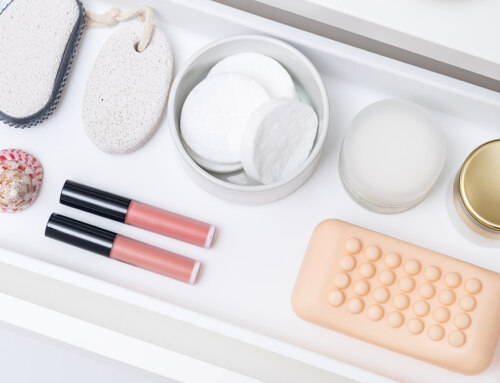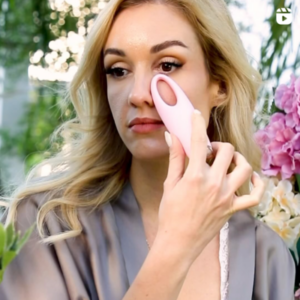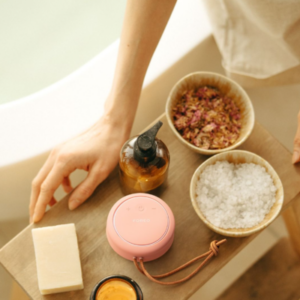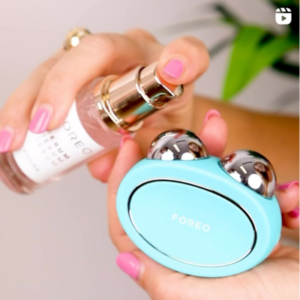What you need to know about sex toys, contraception, STIs, and more.
Have you ever had a sexual health question you were embarrassed to ask? Or have you been thinking about how to mix things up in the bedroom with your partner? Look no further–we interviewed Dr. Leah Millheiser, Director of the Female Sexual Program at Stanford University Medical Center, who gave us exclusive tips on how to lead a happy, exciting, and (most importantly) healthy sex life. Not only is she a sexual medicine expert, but she is also the Chief Scientific Officer at Nuelle, an intimate care company that offers products developed in partnership with women. Committed to caring for women at every stage of life, Dr. Millheiser covers some of the most important topics, including STIs, birth control, and even ovarian cancer prevention. So if you’ve ever hesitated to ask any intimate questions about your sexual wellness, read on below to get the answers straight from the expert.
Contents
- How did you first get started in this field?
- What are some of the most common misconceptions about sexual health?
- How often do women really need go to the gynecologist for a checkup?
- How can we protect ourselves from sexually transmitted infections (STIs)?
- It’s awkward to talk to a new partner about STIs. How and when should we begin that conversation?
- With so many types of birth control out there, how can I find the best option for me?
- What should women know about emergency contraception? Does taking the morning after pill affect your chances of getting pregnant in the future?
- What can women do to help prevent ovarian and cervical cancer?
- Things are a little slow in the bedroom. Why do our moods and preferences change when it comes to sex? What is happening?
- If we want to explore sex toys, how can we start? What are the benefits of using sex toys?
- If I use a sex toy, how often should I clean it? If I don’t want to buy sex toy-specific cleaning products, how else can I clean my toys?
- How bad are the chemicals in lubricant? What are some safer/more natural alternatives to lubricant?
- Do you have any last bits of advice to give to women for the best ways to have a healthy and happy sex life?
How did you first get started in this field?
My interest in female sexual medicine began when I was very young. Back in the ‘80s, I used to listen to Dr. Ruth’s radio show every Sunday night. I was fascinated with how she was able to have such a profound impact on the quality of life of others simply by addressing their sexual concerns. I made it my mission to follow in her footsteps someday. I realized, after taking a detour as an art history major, that medicine really was my calling and that the best way to fulfill my dream of focusing on sexual health was to become a gynecologist. During my residency, which happened at the time Viagra was released, it saddened me to see how many women had sexual concerns that were not being adequately addressed. This really was not the fault of the clinicians in the sense that we did not have the proper training in the field and there weren’t any evidence-based solutions. As a result, I received a National Institute of Health scholarship to study female sexual medicine and started the Female Sexual Medicine Program at Stanford, where I continue to practice today.
What are some of the most common misconceptions about sexual health?
That there are different types of orgasms (vaginal vs. clitoral). Over the past few years, we have seen more and more research pointing to the clitoris as being the main source of orgasms in women. I see many women in my clinic who are distressed by the fact that they cannot have a vaginal orgasm during penetrative intercourse. The truth is, most women don’t have an orgasm without some kind of clitoral stimulation. This could be in the form of self-stimulation, partner stimulation of a woman’s clitoris, or a vibrating sex toy applied to the clitoris. Some women who have a shorter distance between their vaginal opening and clitoris tend to have an easier time achieving orgasm during penetrative vaginal intercourse.
How often do women really need go to the gynecologist for a checkup?
This is a tricky question as there is still some debate between various health organizations on this. The American College of Obstetricians and Gynecologists still recommends yearly pelvic exams for women over the age of 21. However, this recommendation is currently under review.
How can we protect ourselves from sexually transmitted infections (STIs)?
Taking abstinence out of the equation, proper use of barrier protection is the best way to protect from STIs during oral, anal, and vaginal penetration. Sharing sex toys, such as dildos and vibrators, during a sexual act can also spread infection, so it is important to use condoms on them, as well.
It’s awkward to talk to a new partner about STIs. How and when should we begin that conversation?
That conversation should happen before any sexual activity takes place. Testing of both partners for STIs before sex takes place should be the norm. Beginning a relationship by being deceitful about a known STI can often spell doom for the relationship. Also, knowingly spreading HIV can send someone to jail. Educating your partner on the type of STI that you have (e.g. genital herpes, HPV) and using barrier protection is necessary to reduce its spread. If you are in a relationship with multiple partners or there has been infidelity in the relationship, testing should occur more often.
With so many types of birth control out there, how can I find the best option for me?
There are many options available, both hormonal and nonhormonal, and choosing the right one really warrants a thorough conversation between a woman and her clinician. I always take into consideration a woman’s general health, lifestyle, and future family planning needs when working with her to make the right contraception choice.
What should women know about emergency contraception? Does taking the morning after pill affect your chances of getting pregnant in the future?
Emergency contraception (EC) is a great option for women who either did not use contraception or their contraception failed (e.g. the condom broke). It should be taken within 72 hours of the event. EC does not affect future chances of getting pregnant at all.
What can women do to help prevent ovarian and cervical cancer?
Certain lifestyle changes may reduce the risk, such as avoiding the use of products on the genitals that contain talc. Having your tubes tied for contraception or removing the fallopian tubes at the time of hysterectomy may also reduce the risk of ovarian cancer. The majority of cervical cancer cases are caused by the human papilloma virus (HPV). Therefore, using barrier protection during sexual activity is important for preventing transmission.
Things are a little slow in the bedroom. Why do our moods and preferences change when it comes to sex? What is happening?
There are many things that affect a woman’s sexual mood. In order to understand the issue, it’s important to approach any concerns for a biopsychosocial perspective. For example, what are the possible health issues or medications, lifestyle stressors, relationship issues, etc. that may be contributing to these changes?
If we want to explore sex toys, how can we start? What are the benefits of using sex toys?
I consider sex toys a very important tool in the “arsenal” of products to address sexual health concerns. For example, vibrators are incredibly helpful for women after menopause who have difficulty achieving orgasm or have experienced a lessening in their orgasmic intensity. The best way to start is either to get a recommendation from your clinician or perhaps a trusted friend, or to visit your local sex toy shop that caters to women’s needs and education (e.g. Babeland, Good Vibrations, etc.)
If I use a sex toy, how often should I clean it? If I don’t want to buy sex toy-specific cleaning products, how else can I clean my toys?
First, it’s important to follow the rules of sex toys. If you’re using a silicone toy, you should not use a silicone-based lubricant with it as this can break down the material of the toy, which then creates an environment that harbors more bacteria. Secondly, if sharing toys during a sexual act, you should place a condom on the toy and switch the condom after each partner’s use. In regards to washing the toy, I do recommend a thorough wash with a soapy cleanser immediately after use. There was one small study that showed that the HPV virus may be harder to wash away, which is why it’s important to either not share toys or to use a condom on them.
How bad are the chemicals in lubricant? What are some safer/more natural alternatives to lubricant?
Personal lubricants are safe and are regulated by the FDA. A woman should choose the lubricant based on her own personal and health needs. Some women tend to be more sensitive to the glycerin in lubricants, making her more prone to developing a yeast infection, so for these women, there are glycerin-free options that are just as effective. Other women may prefer paraben-free options, which are also widely-available. For other women, their skin may be extremely sensitive to all of these over-the-counter options and may choose to use the natural oils for a lubricant, such as coconut oil or olive oil. If using an oil, you cannot use a latex condom, as it will make it easier for the condom to break.
Do you have any last bits of advice to give to women for the best ways to have a healthy and happy sex life?
Speak openly and honestly with your partner about what your needs are during sexual intimacy. Ultimately, that is the only way to get what you want and need in the bedroom. This will only serve to increase sexual satisfaction. If you aren’t sure what you like, it’s a good idea to do some self-exploration.





















I totally agree with you. speaking about your sexual needs with your partner can definitely increase sexual satisfaction. Thank you so much for this Q/A session about sexual health. I got so many doubts clear.
Thank you for reading Elena! :)
My partner completely lost his interest because of loose vaginal area then i come across dermalmd vaginal serum it really changed my life it helped me to regain the tighteness of vaginal area and my partners interest too!!